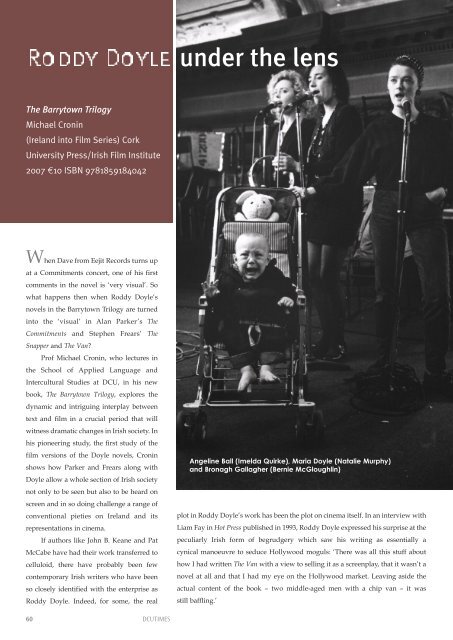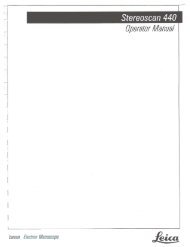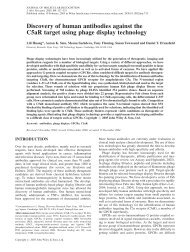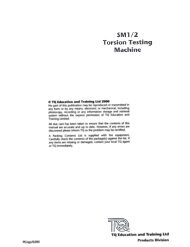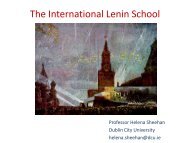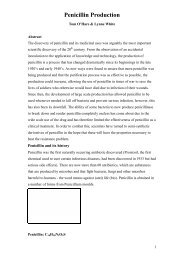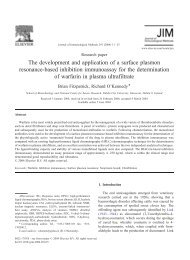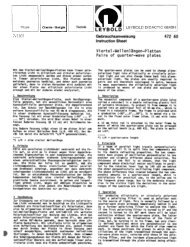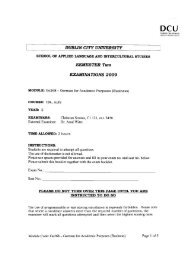Roddy Doyle under the lens
Roddy Doyle under the lens
Roddy Doyle under the lens
Create successful ePaper yourself
Turn your PDF publications into a flip-book with our unique Google optimized e-Paper software.
<strong>Roddy</strong> <strong>Doyle</strong> <strong>under</strong> <strong>the</strong> <strong>lens</strong><br />
The Barrytown Trilogy<br />
Michael Cronin<br />
(Ireland into Film Series) Cork<br />
University Press/Irish Film Institute<br />
2007 ?10 ISBN 9781859184042<br />
When Dave from Eejit Records turns up<br />
at a Commitments concert, one of his first<br />
comments in <strong>the</strong> novel is ‘very visual’. So<br />
what happens <strong>the</strong>n when <strong>Roddy</strong> <strong>Doyle</strong>’s<br />
novels in <strong>the</strong> Barrytown Trilogy are turned<br />
into <strong>the</strong> ‘visual’ in Alan Parker’s The<br />
Commitments and Stephen Frears’ The<br />
Snapper and The Van?<br />
Prof Michael Cronin, who lectures in<br />
<strong>the</strong> School of Applied Language and<br />
Intercultural Studies at DCU, in his new<br />
book, The Barrytown Trilogy, explores <strong>the</strong><br />
dynamic and intriguing interplay between<br />
text and film in a crucial period that will<br />
witness dramatic changes in Irish society. In<br />
his pioneering study, <strong>the</strong> first study of <strong>the</strong><br />
film versions of <strong>the</strong> <strong>Doyle</strong> novels, Cronin<br />
shows how Parker and Frears along with<br />
<strong>Doyle</strong> allow a whole section of Irish society<br />
not only to be seen but also to be heard on<br />
screen and in so doing challenge a range of<br />
conventional pieties on Ireland and its<br />
representations in cinema.<br />
If authors like John B. Keane and Pat<br />
McCabe have had <strong>the</strong>ir work transferred to<br />
celluloid, <strong>the</strong>re have probably been few<br />
contemporary Irish writers who have been<br />
so closely identified with <strong>the</strong> enterprise as<br />
<strong>Roddy</strong> <strong>Doyle</strong>. Indeed, for some, <strong>the</strong> real<br />
60 DCUTIMES<br />
Angeline Ball (Imelda Quirke), Maria <strong>Doyle</strong> (Natalie Murphy)<br />
and Bronagh Gallagher (Bernie McGloughlin)<br />
plot in <strong>Roddy</strong> <strong>Doyle</strong>’s work has been <strong>the</strong> plot on cinema itself. In an interview with<br />
Liam Fay in Hot Press published in 1993, <strong>Roddy</strong> <strong>Doyle</strong> expressed his surprise at <strong>the</strong><br />
peculiarly Irish form of begrudgery which saw his writing as essentially a<br />
cynical manoeuvre to seduce Hollywood moguls: ‘There was all this stuff about<br />
how I had written The Van with a view to selling it as a screenplay, that it wasn’t a<br />
novel at all and that I had my eye on <strong>the</strong> Hollywood market. Leaving aside <strong>the</strong><br />
actual content of <strong>the</strong> book – two middle-aged men with a chip van – it was<br />
still baffling.’
“ There was<br />
all this stuff<br />
about how I had<br />
written The Van<br />
with a view to selling it<br />
as a screenplay,<br />
that it wasn’t a novel<br />
at all and that<br />
I had my eye on<br />
<strong>the</strong> Hollywood market.<br />
Leaving aside <strong>the</strong><br />
actual content of <strong>the</strong> book<br />
– two middle-aged men<br />
with a chip van –<br />
”<br />
it was still baffling.<br />
<strong>Doyle</strong> is right to be sceptical about<br />
<strong>the</strong> motives of his more malign critics but<br />
he should be less baffled that his work is<br />
associated with an artistic practice that<br />
has been an integral part not only of <strong>the</strong><br />
lives of characters but of his own activity<br />
as a writer.<br />
In his study, Cronin concentrates <strong>the</strong><br />
high point of that activity, namely <strong>the</strong> film<br />
versions of three novels which constitute<br />
<strong>the</strong> Barrytown Trilogy, and which<br />
appeared as The Commitments (1991), The<br />
Snapper (1993) and The Van (1996). Taken<br />
toge<strong>the</strong>r, <strong>the</strong> novels and <strong>the</strong> films constitute<br />
a crucial body of work that<br />
not only give voice to <strong>the</strong> particular<br />
preoccupations of <strong>the</strong> recent Irish past but<br />
remain startlingly contemporary in <strong>the</strong><br />
manner in which <strong>the</strong>y articulate <strong>the</strong><br />
specific relationship between Irish locality<br />
and global futures. Cronin shows how <strong>the</strong><br />
films give rise to a new <strong>under</strong>standing of<br />
Donal O'Kelly (Bimbo) and Colm Meany (Larry)<br />
DCUTIMES<br />
place and identity in Ireland, and offers<br />
crucial insights into <strong>the</strong> importance of<br />
popular culture in reworking established<br />
categories of identification and belonging.<br />
Most importantly, Cronin<br />
demonstrates how <strong>the</strong> films in <strong>the</strong><br />
Barrytown Trilogy can be viewed as part<br />
of a project of generation and a crucible of<br />
change. The films ra<strong>the</strong>r than being <strong>the</strong><br />
last chapters in a romance of loss penned<br />
by <strong>the</strong> disaffected form <strong>the</strong> template for<br />
<strong>the</strong> emergence of a new kind of Ireland.<br />
The Commitments on stage. Bronagh Gallagher (Bernie McGloughlin), Angeline Ball (Imelda Quirke), Maria<br />
<strong>Doyle</strong> (Natalie Murphy), Felim Gormley (Dean Fay), Johnny Murphy (Joey ‘The Lips’ Fagan), Kenneth<br />
McCluskey (Derek Scully), Andrew Strong (Deco Cuffe), Dick Massey (Billy Mooney), Glen Hansard (Outspan<br />
Foster)<br />
61


